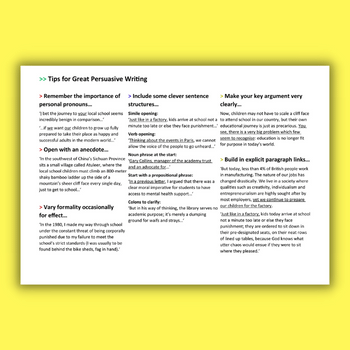This PDF for KS3/4 students presents six concise points of advice for writing persuasively, with examples. It serves as a guide for pupils, providing them with practical tools and examples to enhance their persuasive writing skills.
The importance of personal pronouns
This section explains how using personal pronouns like ‘I’, ‘you’, and ‘we’ can create a direct and personal connection with the reader. It makes the writing more relatable and engaging, as shown in the provided example.
Opening with an anecdote
The guide emphasises the power of starting with a short, interesting story or anecdote to grab the reader’s attention when writing persuasively. It illustrates how an anecdote, like the one included about children in Atuleer, can vividly set the scene and provide a real-world context for your argument.
Varying formality occasionally for effect
This advice highlights the strategic use of shifting between formal and informal tones when writing persuasively to keep the reader interested. It suggests that varying formality can add personality to your writing and make complex ideas more accessible.
Including clever sentence structures
The document provides examples of similes, verbs, noun phrases, prepositional phrases, and the use of colons. It explains how using these elements when writing persuasively can add variety and sophistication to writing, making the argument more compelling.
Making your key argument clearly
This section stresses the importance of articulating your main argument in a clear, concise manner when writing persuasively. It shows how a straightforward statement can effectively convey your central idea.
Building in explicit paragraph links
The PDF describes how to create smooth transitions between paragraphs. This technique helps in maintaining the flow of the argument, making it easier for the reader to follow your line of reasoning.
Anthony Cockerill is Head of English at Boroughbridge High School, North Yorkshire; for more information, visit anthonycockerill.com or follow @thecockerill. Read more about persuasive writing techniques.














